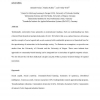Free Online Productivity Tools
i2Speak
i2Symbol
i2OCR
iTex2Img
iWeb2Print
iWeb2Shot
i2Type
iPdf2Split
iPdf2Merge
i2Bopomofo
i2Arabic
i2Style
i2Image
i2PDF
iLatex2Rtf
Sci2ools
CSCL
2007
2007
Community-based learning: The core competency of residential, research-based universities
Traditionally, universities focus primarily on instructionist teaching. Such an understanding has been criticized from theoretical and practical points of view. We believe that socio-cultural theories of learning and the concepts of social capital and social creativity hold considerable promise as a theoretical base for the repositioning of universities in the knowledge society. To illustrate our assumption, we provide case studies from the University of Colorado and the University of Siegen. These cases indicate how approaches to community-based learning can be integrated into a curriculum of applied computer science. We also discuss the role these didactical concepts can play within a practice-oriented strategy of regional innovation. Keywords Social capital, Social creativity, Community-based learning, Symmetry of ignorance, Distributed intelligence, Courses-as-seeds, Courses in practice (CiP), Undergraduate research apprenticeship program, Transdisciplinary education, Communities ...
| Added | 13 Dec 2010 |
| Updated | 13 Dec 2010 |
| Type | Journal |
| Year | 2007 |
| Where | CSCL |
| Authors | Gerhard Fischer, Markus Rohde, Volker Wulf |
Comments (0)

